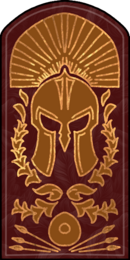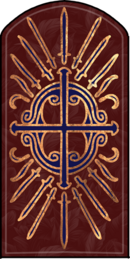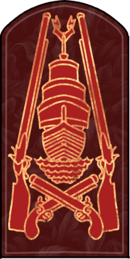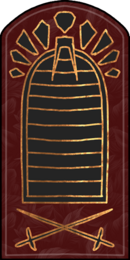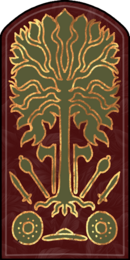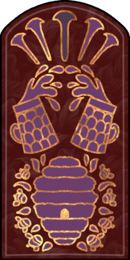Bloodcast Order: Difference between revisions
No edit summary |
m (→Chapters) |
||
| (34 intermediate revisions by 5 users not shown) | |||
| Line 1: | Line 1: | ||
{{Info knights | {{Info knights | ||
|image = | |image = Bloodcastorder.png | ||
|pronunciation = Blood-cast | |pronunciation = Blood-cast | ||
|origins = [[City of Regalia]] | |origins = [[City of Regalia]] | ||
|grandmaster = | |grandmaster = Richard Durwallis | ||
|colors = Black and Crimson Red | |colors = Black and Crimson Red | ||
|}} | |}} | ||
The Bloodcast Order is the | The Bloodcast Order is an Order forged in the betrayal of another. When five dissenting [[Viridian Order | Viridians]] charged across the Imperial bridge to warn the Emperor of the betrayal of the Viridian Order to stage a Coup, their cloaks were soaked in the blood of their former brothers. As they kneeled to warn the Emperor of their former brothers, they rose as Bloodcast, having rejected the Code of Chivalry, and donned their own moral Code against what they saw as the corruption that power brings. While the Bloodcast are still [[Knights]], their Order is considered the closest approximation of a Hedge Knight with far looser restrictions than the other Knight Orders. In fact, to a degree, Bloodcast Knights are considered the anti-Knights that not only keep other Knights in check from abusing their powers, but more widely also the Nobility and other systems of power. While other Knight Orders claim to protect the common folk, this often is purely virtue signaling as window dressing for their ideology. Only the Bloodcast are the true defenders of the common folk. | ||
==Design== | |||
Bloodcast Knights follow in much the same vein as Viridians, in that they appear like typical medieval feudal knights, and are honor-bound state enforcers, but their reliance is less on chivalric behavior, and more on pragmatic individualism. They are often brash, speak frank and crude, and are boisterous and loud, seeking confrontation with the Viridians both for historical and ideological reasons. The following design limitations are enforced on the Bloodcast: | |||
* Predominantly melee with heavy armor, except for light armor on Forneik, Magic in Thousandblade, Forneik and Slavnostni. | |||
* Exception for firearms in Vanatori, and tech and roguery in Slavnostni which can also include bows. | |||
* Can use horses, but mostly avoid it because it's for rich people. Wild beast mounts are fine though. | |||
* Cannot be a Noble (must renounce name/titles/inheritance), or be Married/Romantically involved with Nobles. | |||
* Can be any Heritage but must be Regalian Citizen. | |||
* Can be any Legal Affinity, but never Afflictions (including Broods, because they are indistinguishable) | |||
* All Bloodcast must wear some aspect of red, whether a cape, or hood, or band, or clothing piece. | |||
== | ==Chapters== | ||
The Bloodcast Order is a | All Bloodcast Knights are members of one single Chapter, which grants them a free non-Combat related Mechanic. Changing Chapters is permitted but only infrequently and only through a Staff Ticket where the request is reviewed. | ||
<table style="width: 100%;"><tr><td style="width: 50%; vertical-align: top; text-align: left;"> | |||
<span style="font-size:150%;><center>'''Basileon Chapter'''</center></span> | |||
{| | |||
[[File:Traionbanner.png|130px|caption|left]] | |||
| | |||
The Basileon Chapter is one of the earliest chapters to join the Bloodcast Order from its native Aetosian homeland of Etosil. The Basileon Chapter is often recognized by their traditional (corinthian) helmets, or (roman) gladiatorial helmets. The Basileon Chapter is obsessed with proving and testing military strength, it is an immensely popular Chapter with Ailor, Eronidas, and Maquixtl, who seek out glory and fierce combat in the arena to prove their mettle against other Knights, and outsiders. Basileon Chapter members are frequently also gladiators for hire who sell out their service in the ring to bring prestige and honor to Noble houses or anyone who can afford their service. Basileon Knights also frequently act as physical trainers, drill instructors, and general military practice teachers, due to their length of service. They primarily wield melee weapons though tridents are sometimes also used, as they can be found frequenting regalian coliseums. | |||
* '''Basileon Mechanic:''' Basileon Knights in out-of-combat Strength competitions involving Dice Rolls, can add +5 to any Dice Result. They also gain +2 Main Combat Stat (break cap up to 11) while in an Arena. | |||
|} | |||
</td><td style="vertical-align: top; width: 50%;"> | |||
<span style="font-size:150%;><center>'''Thousandblade Chapter'''</center></span> | |||
{| | |||
[[File:Untitrrled Artwork.png|130px|caption|left]] | |||
| | |||
The Thousandblade Chapter is a relative latecomer to the Bloodcast Order, as it once prided itself in being isolationist in Anglia. The Thousandblade Chapterhouse can be found in Axford, Anglia, which is a monastery surrounded by a wall of rusting swords, planted into the ground for each Knight who retired to the monastery, or Kade Family Member who retreated from public life. Since recent decades, the Order has re-militarized, and recruited new members started actively protecting Temples and particularly Dragon Sites on the personal Orders of House Kade. The Thousandblade Order contains both Draconism and Unionism worshipers, who marry many of their ideological stances to preserve life, but also to protect Dragon Sites and Religious Freedom in the Empire as a memory to Dragons. Thousandblade Knights can be distantly related Cadet branch family members of House Kade, consult in Staff Ticket what this means and how to design it. | |||
* '''Thousandblade Mechanic:''' Thousandblade Knights can circumvent Viridians and communicate with the Palace (through Ticket) directly, and request a [[Profiles|Noted Kade]] to meet them once a month. | |||
|} | |||
</center> | |||
</tr></table> | |||
<table style="width: 100%;"><tr><td style="width: 50%; vertical-align: top; text-align: left;"> | |||
<span style="font-size:150%;><center>'''Vânători Chapter'''</center></span> | |||
{| | |||
[[File:Untssitled Artwork.png|130px|caption|left]] | |||
| | |||
The Vanatori Chapter joined up with the Bloodcast fairly early, but was always more interested in the use of ranged weapons. They were the first chapter besides the obvious Darkwald Lothar, who have widely adopted firearms training in their repetoire. The Vanatori Knights primarily concern themselves with protecting the people against all manner of brigands, thieves, and pirates. They are sometimes also called Nautknights, because many of them actually fight as marine-style Knights on the decks of ships as they board pirate vessels. Vanatori Knights specifically chase after thieves and burglars, seeking to return stolen property to their righteous owners (or who has paid them most). This means they sometimes get involved in fights over valuable objects or Artifacts which have a habit of quickly changing hands, deciding who the righteous owner should be and then making it happen. The Vânători Chapterhouse is in the Vlach lands in Allachia, Baldmark. | |||
* '''Vanatori Mechanic:''' Vanatori Knights can retrieve objects that were stolen from Houses, Persons, or Estates, that were pawned off to any Crime-System related salesperson. | |||
|} | |||
</td><td style="vertical-align: top; width: 50%;"> | |||
<span style="font-size:150%;><center>'''Steelmark Chapter'''</center></span> | |||
{| | |||
[[File:Steelmarks.png|130px|caption|left]] | |||
| | |||
The Steelmark Chapter is a split-off from the infamous Blackmark Knights, who joined up forces with the Iron Duke of Vultaro, and essentially became a private military Mercenary Band. The Steelmark Chapter split off from that Order, refusing to work with the Iron Duke, or simply refusing to be chained down to a single liege-lord. It was induced into the Bloodcast Order fairly quickly, some also say with a modicum of threatening from their part. Steelmark Knights are brutish, large, and wear the intimidating blacksteel plate armor, while using large tower shields or other massive shields that are as big as themselves. They have a reputation of being cruel in combat and crass in a social setting, frequently the ire of Viridians as they barely hold onto the formal Internal Knight Code. Steelmark Knights act as part Knight, part Mercenary, promising to do the basic minimum of being a Bloodcast, so they get to benefit from the Solvaan Mercenary Law exception. | |||
* '''Steelmark Mechanic:''' Steelmark Knights, so long as they obey Bloodcast Code, benefit from the [[Regalian_Law#Citizen_Ordinances|Solvaan Mercenary exception]], allowing them to be paid to beat people up without committing a crime. | |||
|} | |||
</center> | |||
</tr></table> | |||
<table style="width: 100%;"><tr><td style="width: 50%; vertical-align: top; text-align: left;"> | |||
<span style="font-size:150%;><center>'''Forneik Chapter'''</center></span> | |||
{| | |||
[[File:Oldoakbanner.png|130px|caption|left]] | |||
| | |||
The Forneik Chapter, sometimes also called Great Oak Chapter, is a Chapter dominated by beast and monster hunters who compile a compendium of monsters, and how to best hunt them down. The Empire is filled with all manner of mutated beast, wild animals, and the Afflicted and Marken, and the Forneik Chapter brings the answer. Their Chapterhouse is based in Kerulv in Drixagh, the Regalian Archipelago, and is built inside a massive grand oak tree that is hundreds of years old. The Forneik Chapter has many Fornoss faithful or Velheim members, but also recruits outside of the Empire, even Sihndar, who bring valuable information on corrupted monsters that escape Drowda. Forneik Knights frequently fight with roundshields and axes, adopting many Skagger techniques through a lively cooperation with local Velheim clans. Forneik members tend to be more stoic and less talkative than the other Chapters, constantly on the lookout for an ambush. Notably, while Bloodcasts tend to allow Affinites, the Forneik Chapter specifically does not allow its members to have any sort of "monster" transformations, and if discovered, will expel and hunt them down for betraying the mission. | |||
* '''Forneik Mechanic:''' Forneik Knights gain +2 Main Combat Stat (break cap to 11) against opponents that are in a Monstrous Transformation. They also gain options during Monster Hunt events (consult with DM). | |||
|} | |||
</td><td style="vertical-align: top; width: 50%;"> | |||
<span style="font-size:150%;><center>'''Slavnostní Chapter'''</center></span> | |||
{| | |||
[[File:Happyknights.png|130px|caption|left]] | |||
| | |||
The Slavnostní Chapter is a highly unusual Chapter of Knights that both uses unusual combat techniques (Roguery and/or Technology), but also in the sense that they will try to avoid combat as much as possible. Slavnostní Knights hail from the Chapter house Poslední smích in the city of Praag. Although it was once predominantly Zeměvčel in culture, many other peoples of Aloria and cultures have joined to make the people of the Empire merrier and raise morale. That is exactly what the Slavnostní Knights do, hosting parties, getting horrendously drunk, and doing stand up comedy routines to try and ease the trauma, pain, and bad memories of the people and giving them happy days and happy thoughts. Slavnostní Knights also attempt to fight as comedically as possible, to create a spectacle even when they are forced into a fight for onlookers, and generally try to take life as simply and guilt-free as possible and facing each day with a new smile. | |||
* '''Slavnostní Mechanic:''' Slavnostní Knights have an impossibly high tolerance for Alcohol, and can get away with breaking Low and Magic Law, so long as they got a decent laugh out of bystanders. | |||
|} | |||
</center> | |||
</tr></table> | |||
== | ==Internal Bloodcast Code== | ||
Bloodcast Knights | The Internal Bloodcast Code contains additional Honor and Behavior Codes for Bloodcast Knights that are supplemental to the Common Code described on the Knights Page. | ||
# Bloodcast Knights are expected to turn the cheek if a Noble is in trouble (unless in mortal danger), and specifically assist the common folk, especially if they are being abused by the Nobles and the Rich. | |||
# Bloodcast Knights must seek justice for the common folk when the system and authorities fail them or stonewall them, even if this means breaking the law on occasion. | |||
# Bloodcast Knights must reject working with Viridian Knights except for religious reasons (Temple Raids) or to fight a common threat against the Regalian Empire. | |||
# Bloodcast Knights must hold the powers that be accountable, whether secular, religious, or in other Knight Orders, and hold an Accountability Forum to inform the people. | |||
== | ==Bloodcast Jobs== | ||
The | * '''Accountability Forum:''' The Accountability Forum, is one of the levers that Bloodcast have to hold people of power accountable for their abuse of power. An Accountability Forum, is a publicly hosted Event where one or more Bloodcast take to a soap box or forum to proclaim a public debate on the abuse of power of an individual. A Bloodcast can at any point in time call an Accountability Forum by pinning a Server Event to a specific date and time. There, they are expected to make an appeal to the crowd, make their points, and hear out the crowd's supporting or refuting stances. The point is to convince the crowd to agree to a protest against the targeted individual. The targeted individual does not need to be there, but they can show up, and would be allowed to defend themselves for public review. Accountability Forums have no legal basis, they are purely mob justice through debate verdict. | ||
* '''Slum Outreach:''' Slum Outreach is a more passive engagement of the Bloodcast, where they either seek to establish social connections with the downtrodden and forgotten, or specifically roam around Crookback and maybe even the Sewers with the intent of peacefully talking to the locals and discovering their woes and qualms with city goers. Most citizens do not report abuse of power, so the Bloodcasts believe that mingling with the places where this is most acutely felt is the best way to figure out if someone in power is actually abusing anyone. | |||
* | * '''Public Scrutiny:''' Another method of holding powers to account, is Public Scrutiny, which in actually occurs more in private. Bloodcast Knights should constantly be aware of who is in government and what their expectations are. If a government official is slacking, or not fulfilling their job by expectation, Bloodcast are meant to request meetings with them to question their dedication to their position, and encourage resignation if they do not improve their work ethic and discipline, or face an Accountability Forum. Government individuals are meant to feel scrutinized by the Bloodcasts. | ||
* '''Power Separation:''' Bloodcast, as the only Order with 0 involvement in Noble politics and 0 Noble influence in their work, must continually be aware of Noble encroachment on the other Knight Orders. They are expected to pay exceptionally close attention to Nobles who are members of Knight Orders, and how that membership influences the attempt of their family to influence Order politics, or vice versa. Bloodcast Knights believe in true separation, and if a Noble House is found guilty of trying to steer a Knightly Order into their political benefit or starts corrupting their Order Code, Bloodcast are expected to sound all alarm bells very publicly. | |||
* '''Protest Guard:''' The right to protest in Regalia is not a civil right, meaning that protestors usually get arrested. One exception is a protest which is guided by Bloodcast Knights, in which the Knights stand responsible for the good conduct of the Protest. A Protest involves a group of people standing strategically in a specific location like the front door of a Noble Estate, in front of the Golden Willow, or blocking the entryway of the All Beacon Temple or some other building where-in a person they are protesting resides. The Knights must ensure that the protest does not turn violent and that slogans and speeches are acceptable within the norms of the Court and Emperor's respect. Finally, they must also protect the protest from any counter-protest violence. Protests are encouraged to be pinned as server Events. | |||
* | |||
* | |||
* | |||
== | ==History== | ||
Order | Bloodcast Order history is surprisingly simple, and concise. The order officially started in 122 AC, during the [[Viridian Coup Attempt]]. Five Viridian Knights defied the other Viridian Knights who intended to imprison Emperor [[Henri III]] and usurp the throne, by riding to the Emperor and warning him. On their way to the castle, the five Knights were attacked by their fellow brothers in arms, but were victorious and rode on to the Palace to warn the Emperor, which would eventually lead to the rounding up and execution of the Viridian Knights who plotted treason. The five Knights, after having been attacked and riding to the Emperor, rode with their usual green capes covered in blood, hence becoming red. They then swore an oath to do better than what the Viridians had, and Emperor Henri III gave them the rights to found a new Knighthood Chapter, ostensibly to compete with the Viridians who were already severely reduced in power, but also to cover the blind spots the Viridians could not in society. Those five ex-Viridians thus founded the Bloodcast Order, became its first teachers and Elder Council, and lead the order until the last of them, Councilmaster Henry of Benteford, died in 167 AC. The Order's history has otherwise been somewhat unremarkable. They have been present in every single war and conflict Regalia has been in, though always less visible than the Viridians who seize the moment and the limelight. They have been involved in many of the greatest arrests in Regalian law enforcement, but always bow out at the end so as to avoid being involved in the regime's repression efforts on those who were guilty by association. Many Bloodcast Knights go about their lives remaining largely unknown to the people, wandering the roads in the countryside to offer help and support to areas and peoples that the Viridians are too good for and the Aelrrigans too busy for. | ||
==Trivia== | ==Trivia== | ||
* | * Bloodcast Knighthood is rejected in Ithania. Without a formal Chivalric Code, they are not considered valid Knights. | ||
* | * The Bloodcast Order is particularly rough on people who violate the boundary against Nobility and Viridians. | ||
* | * As Hedge Knights, Bloodcast Knights should not be expected to be treated as privileged social classes by Nobles. | ||
{{Organizations}} | {{Organizations}} | ||
{{Accreditation | {{Accreditation | ||
|Artists = MonMarty | |Artists = MonMarty | ||
|Writers = MonMarty | |Writers = MonMarty | ||
|Processors = | |Processors = HydraLana, FireFan96 | ||
}} | }} | ||
[[category:Organizations]] [[category:Knight Orders]] | [[category:Organizations]] [[category:Knight Orders]] | ||
Latest revision as of 00:50, 10 April 2024
| Bloodcast Order | |
|---|---|
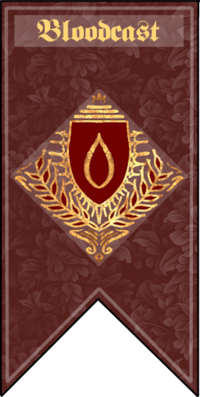 | |
| Order | |
| Pronunciation | Blood-cast |
| Origins | City of Regalia |
| Grandmaster | Richard Durwallis |
| Colors | Black and Crimson Red |
The Bloodcast Order is an Order forged in the betrayal of another. When five dissenting Viridians charged across the Imperial bridge to warn the Emperor of the betrayal of the Viridian Order to stage a Coup, their cloaks were soaked in the blood of their former brothers. As they kneeled to warn the Emperor of their former brothers, they rose as Bloodcast, having rejected the Code of Chivalry, and donned their own moral Code against what they saw as the corruption that power brings. While the Bloodcast are still Knights, their Order is considered the closest approximation of a Hedge Knight with far looser restrictions than the other Knight Orders. In fact, to a degree, Bloodcast Knights are considered the anti-Knights that not only keep other Knights in check from abusing their powers, but more widely also the Nobility and other systems of power. While other Knight Orders claim to protect the common folk, this often is purely virtue signaling as window dressing for their ideology. Only the Bloodcast are the true defenders of the common folk.
Design
Bloodcast Knights follow in much the same vein as Viridians, in that they appear like typical medieval feudal knights, and are honor-bound state enforcers, but their reliance is less on chivalric behavior, and more on pragmatic individualism. They are often brash, speak frank and crude, and are boisterous and loud, seeking confrontation with the Viridians both for historical and ideological reasons. The following design limitations are enforced on the Bloodcast:
- Predominantly melee with heavy armor, except for light armor on Forneik, Magic in Thousandblade, Forneik and Slavnostni.
- Exception for firearms in Vanatori, and tech and roguery in Slavnostni which can also include bows.
- Can use horses, but mostly avoid it because it's for rich people. Wild beast mounts are fine though.
- Cannot be a Noble (must renounce name/titles/inheritance), or be Married/Romantically involved with Nobles.
- Can be any Heritage but must be Regalian Citizen.
- Can be any Legal Affinity, but never Afflictions (including Broods, because they are indistinguishable)
- All Bloodcast must wear some aspect of red, whether a cape, or hood, or band, or clothing piece.
Chapters
All Bloodcast Knights are members of one single Chapter, which grants them a free non-Combat related Mechanic. Changing Chapters is permitted but only infrequently and only through a Staff Ticket where the request is reviewed.
|
|
|
|
|
|
Internal Bloodcast Code
The Internal Bloodcast Code contains additional Honor and Behavior Codes for Bloodcast Knights that are supplemental to the Common Code described on the Knights Page.
- Bloodcast Knights are expected to turn the cheek if a Noble is in trouble (unless in mortal danger), and specifically assist the common folk, especially if they are being abused by the Nobles and the Rich.
- Bloodcast Knights must seek justice for the common folk when the system and authorities fail them or stonewall them, even if this means breaking the law on occasion.
- Bloodcast Knights must reject working with Viridian Knights except for religious reasons (Temple Raids) or to fight a common threat against the Regalian Empire.
- Bloodcast Knights must hold the powers that be accountable, whether secular, religious, or in other Knight Orders, and hold an Accountability Forum to inform the people.
Bloodcast Jobs
- Accountability Forum: The Accountability Forum, is one of the levers that Bloodcast have to hold people of power accountable for their abuse of power. An Accountability Forum, is a publicly hosted Event where one or more Bloodcast take to a soap box or forum to proclaim a public debate on the abuse of power of an individual. A Bloodcast can at any point in time call an Accountability Forum by pinning a Server Event to a specific date and time. There, they are expected to make an appeal to the crowd, make their points, and hear out the crowd's supporting or refuting stances. The point is to convince the crowd to agree to a protest against the targeted individual. The targeted individual does not need to be there, but they can show up, and would be allowed to defend themselves for public review. Accountability Forums have no legal basis, they are purely mob justice through debate verdict.
- Slum Outreach: Slum Outreach is a more passive engagement of the Bloodcast, where they either seek to establish social connections with the downtrodden and forgotten, or specifically roam around Crookback and maybe even the Sewers with the intent of peacefully talking to the locals and discovering their woes and qualms with city goers. Most citizens do not report abuse of power, so the Bloodcasts believe that mingling with the places where this is most acutely felt is the best way to figure out if someone in power is actually abusing anyone.
- Public Scrutiny: Another method of holding powers to account, is Public Scrutiny, which in actually occurs more in private. Bloodcast Knights should constantly be aware of who is in government and what their expectations are. If a government official is slacking, or not fulfilling their job by expectation, Bloodcast are meant to request meetings with them to question their dedication to their position, and encourage resignation if they do not improve their work ethic and discipline, or face an Accountability Forum. Government individuals are meant to feel scrutinized by the Bloodcasts.
- Power Separation: Bloodcast, as the only Order with 0 involvement in Noble politics and 0 Noble influence in their work, must continually be aware of Noble encroachment on the other Knight Orders. They are expected to pay exceptionally close attention to Nobles who are members of Knight Orders, and how that membership influences the attempt of their family to influence Order politics, or vice versa. Bloodcast Knights believe in true separation, and if a Noble House is found guilty of trying to steer a Knightly Order into their political benefit or starts corrupting their Order Code, Bloodcast are expected to sound all alarm bells very publicly.
- Protest Guard: The right to protest in Regalia is not a civil right, meaning that protestors usually get arrested. One exception is a protest which is guided by Bloodcast Knights, in which the Knights stand responsible for the good conduct of the Protest. A Protest involves a group of people standing strategically in a specific location like the front door of a Noble Estate, in front of the Golden Willow, or blocking the entryway of the All Beacon Temple or some other building where-in a person they are protesting resides. The Knights must ensure that the protest does not turn violent and that slogans and speeches are acceptable within the norms of the Court and Emperor's respect. Finally, they must also protect the protest from any counter-protest violence. Protests are encouraged to be pinned as server Events.
History
Bloodcast Order history is surprisingly simple, and concise. The order officially started in 122 AC, during the Viridian Coup Attempt. Five Viridian Knights defied the other Viridian Knights who intended to imprison Emperor Henri III and usurp the throne, by riding to the Emperor and warning him. On their way to the castle, the five Knights were attacked by their fellow brothers in arms, but were victorious and rode on to the Palace to warn the Emperor, which would eventually lead to the rounding up and execution of the Viridian Knights who plotted treason. The five Knights, after having been attacked and riding to the Emperor, rode with their usual green capes covered in blood, hence becoming red. They then swore an oath to do better than what the Viridians had, and Emperor Henri III gave them the rights to found a new Knighthood Chapter, ostensibly to compete with the Viridians who were already severely reduced in power, but also to cover the blind spots the Viridians could not in society. Those five ex-Viridians thus founded the Bloodcast Order, became its first teachers and Elder Council, and lead the order until the last of them, Councilmaster Henry of Benteford, died in 167 AC. The Order's history has otherwise been somewhat unremarkable. They have been present in every single war and conflict Regalia has been in, though always less visible than the Viridians who seize the moment and the limelight. They have been involved in many of the greatest arrests in Regalian law enforcement, but always bow out at the end so as to avoid being involved in the regime's repression efforts on those who were guilty by association. Many Bloodcast Knights go about their lives remaining largely unknown to the people, wandering the roads in the countryside to offer help and support to areas and peoples that the Viridians are too good for and the Aelrrigans too busy for.
Trivia
- Bloodcast Knighthood is rejected in Ithania. Without a formal Chivalric Code, they are not considered valid Knights.
- The Bloodcast Order is particularly rough on people who violate the boundary against Nobility and Viridians.
- As Hedge Knights, Bloodcast Knights should not be expected to be treated as privileged social classes by Nobles.
| ||||||||||||||||||||||
| Accreditation | |||||||||
|---|---|---|---|---|---|---|---|---|---|
|
| ||||||||
